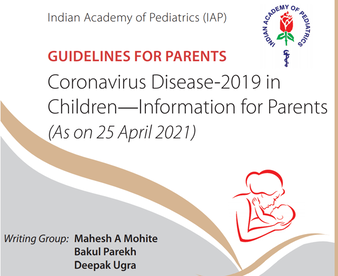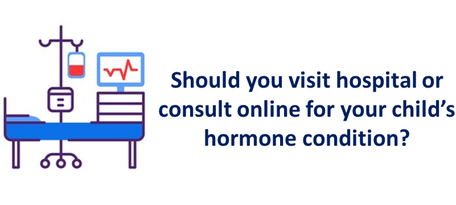Posted on May 01, 2021
Need for Hospital Visit during Covid-19 Outbreak – A brief guidance to the parents of children with hormone problems
The world has changed from the way we know it in the last couple of months due to the unprecedented Covid-19 pandemic. With the mass availability of vaccine not yet on the horizon, social distancing is going to be the new normal for the foreseeable future. For the next few months, it is prudent to limit in-person hospital visits as much as possible for the safety of patients as well as healthcare workers. However it is also important to know when NOT to hesitate to visit the emergency department.
Hormone problems are often chronic conditions and these children need to be in regular contact with their endocrinologist. Necessity brought by this pandemic opened new ways of doing so. Increasing numbers of hospitals and individual physicians are becoming available for video consultations. And most of the hospitals are open for emergencies even during lockdown. It is essential for parents to be vigilant, recognize and treat emergencies early, prevent them when possible, and finally know when to take their child to the hospital. Depending on the type of hormone problem the child has, here is some advice on how to prevent and respond to common emergencies.
1. TYPE 1 DIABETES
EMERGENCY: Persistently high blood glucose levels (> 250-300 mg/dl) especially when child is unwell (fever, vomiting, loose stools, stomach pain, lethargy/dull, or sleepy)
Check Ketones if you have urine ketodiastix.
– If Ketones are more than trace present, your child needs more Insulin.
– Check and see if your Insulin is working or not. Actrapid and all newer insulins should be clear as water, and should not be cloudy or lumpy. NPH will be cloudy but not lumpy. Insulin will not work if it is frozen or kept in direct sunlight and heat. Change vial/pen if in doubt.
– Follow sick day rules as advised by your doctor, by giving extra Insulin every 3-4 hours. If not sure what to do, contact your doctor by video consult or WhatsApp consult or by a phone message.
– Check ketones every time child passes urine. If blood glucose continues to be high and ketones are moderate to strong positive, you need to visit the emergency room.
If ketones checking is not possible at home:
Try and follow sick day rules by giving extra Insulin as advised by your doctor. Contact your doctor. Visit emergency room if child continues to have high blood glucose, lethargic, dull, complaining of stomach pain, nausea or vomiting.
2. TYPE 1 DIABETES,
PHHI (persistent hyperinsulinemic hypoglycemia) and
CAH (Congenital adrenal hyperplasia) on HISONE replacement
EMERGENCY: Severe Hypoglycemia: Low blood sugar (<70 mg/dl) with drowsiness, unresponsive or seizures
If Inj. Glucagon available:
– Administer Inj. Glucagon (0.5 ml if child weighs less than 25 kg, 1ml if the child weighs more than 25 kg) on lateral thigh intramuscularly or subcutaneously.
– In 10-15 minutes child is expected to regain consciousness. Check blood glucose again and give a small snack (eg. A glass of milk or a slice of bread). If the child continues to be not responsive, take him/her to the hospital immediately.
If Inj. Glucagon is not available at home:
Take the child to hospital immediately for IV glucose injection. DO NOT try to force sugar water into child’s mouth. While going to hospital, make a paste of Glucon-D powder with little water and rub this paste between child’s gums and lips.
PREVENT HYPOGLYCEMIA IN ILLNESS:
If Type 1 Diabetes:
– Check blood glucose more frequently especially if the child is not well (fever, loose stools, vomiting). If blood glucose is consistently less than 100 mg/dl, decrease your Insulin doses.
– If child does not accept food or vomits after taking Insulin injection, try to give sips of sugar containing liquids (ORS, fruit juice, thin lassi, diluted milk with sugar) to prevent hypoglycemia.
– Try to purchase Inj. Glucagon and keep stock at home.
If PHHI and on Tablet. Diazoxide:
– Follow same advice as above.
– Keep Inj. Glucagon at home as emergency medicine.
If CAH on Hisone tablets:
If the child is unwell (Fever, vomiting or loose stools) give STRESS DOSE Hisone. DO NOT FORGET. Stress dose is usually 3 times the usual dose of Hisone. If the child is on Floricort also, there is no need to increase Floricort’s dose.
If the child seems very dull, sleepy, if his/her hands and feet are cool to touch, he/she needs immediate Hydrocortisone injection. Take the child to nearest hospital.
– Try to purchase Inj. Hydrocortisone and keep it with you. Any local RMP can administer the injection on lateral thigh.
Dosing:
Up to age 3 years: 25 mg Hydrocortisone IM/IV
3-12 years: 50 mg Hydrocortisone IM/IV
> 12 years: 100 mg Hydrocortisone IM/IV
Further dosing every 6 hours if the child continues to be unwell (better to contact your doctor)
Up to 3 years: 10 mg IV/IM every 6 hours
3-6 years: 15mg IV/IM every 6 hours
More than 6 years: 25 mg IM/IV every 6 hours
3. THYROID, PUBERTY & GROWTH and other disorders:
All children on Thyroid medication, puberty medication (for early or delayed puberty), and growth medication continue to take medication as usual. They can postpone any routine 3 monthly doctor visits for a month or two. If you run out of medicines, you can purchase more, and continue same dose as before till you see the doctor again. When possible and when needed contact your doctor by video consultation.
For children with Type 1 Diabetes:
If you are facing trouble procuring the Insulins you can use some Insulins interchangeably for a time period
Eg: – Actrapid, Humulin-R, Humalog, Novorapid, Apidra and Fiasp can be used interchangeably as a temporary replacement
– Lantus, Basalog, and Tresiba can be used interchangeably as a temporary replacement.
Here is a list of numbers to contact to get Insulin supply




